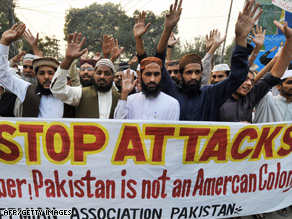ISLAMABAD, Pakistan, Dec. 11 -- Pakistan on Thursday closed 11 offices of a controversial Islamic charity that has been linked to last month's deadly attacks in the Indian city of Mumbai and placed the group's leader under house arrest. In India, top government officials announced a massive revamping of the country's security infrastructure, including creation of an FBI-style national agency to investigate terror attacks.
Hafiz Sayeed, the leader of the organization Jamaat-ud-Dawa, was put under house arrest in Lahore, according to a Pakistani foreign ministry official who spoke on condition of anonymity. The arrest was confirmed by a top Jamaat-ud-Dawa official.
Sayeed was one of four individuals singled out by the United Nations Security Council late Wednesday when it placed Jamaat-ud-Dawa on a list of designated terrorist organizations and imposed sanctions on the group, including a freeze on assets, a travel ban and an arms embargo. The U.N. also said the charity was directly linked to Lashkar-i-Taiba, the outlawed Pakistani militant group that Indian authorities blame for the three-day siege in Mumbai that killed at least 171 people, including six Americans.
"Pakistan has taken note of the designation of certain individuals and entities by the U.N.," Pakistani Prime Minister Yousaf Raza Gillani said in a statement hours before the house arrest, noting that the country would "fulfill its international obligations."
Also included in the sanctions were Zaki-ur-Rehman Lakhvi, the alleged operational commander and architect of the Mumbai attacks, and alleged Lashkar financiers Haji Muhammad Ashraf and Mahmoud Ahmed Bahaziq. Pakistani security forces arrested Lakhvi Sunday.
Before arresting Sayeed late Thursday, Pakistan shuttered nine Karachi offices of Jamaat-ud-Dawa and the group's main offices in Lahore and Muridke. Jamaat official Amir Hamza said Thursday night that 70 to 80 members of the organization were rounded up in raids that took place across the country. Hamza said Pakistani authorities had placed him and eight others on a wanted list and were preparing to arrest them.
"We are expecting to be picked up any minute," Hamza said. "We will fight our battles in court. We will not resort just to street protests. This is a great injustice."
Indian officials hailed Wednesday night's U.N. action as a long overdue step in the right direction, and called on Pakistan not to repeat a past pattern of arresting suspected extremists -- including Sayeed -- and then letting them go without standing trial..
"This only underscores what India has maintained throughout. That the forces of violence and terror, the organized groups which have attacked India on many occasions . . . pose a threat to civil world," Indian Deputy Foreign Minister Anand Sharma said.
Foreign Minister Pranab Mukherjee told the country's parliament that Pakistan needed to follow up on its promises of action against militant groups. "They are banning organizations. Lashkar-i-Taiba was banned. But simply they are changing names, they are changing signboards," Mukherjee said. "Faces are the same, ideology are the same. How does it help us?"
Sayeed reacted to the imposition of sanctions with a news conference at his Lahore headquarters, hours before he was placed under house arrest. He denied reports that he had met with a Mumbai attacker and said his group split from Lashkar after Pakistan banned Lashkar following a 2001 attack on India's parliament. Sayeed said Jamaat-ud-Dawa would lodge a strong protest with the U.N. and the International Court of Justice in the Hague.
"Jamaat-ud-Dawa is a thorn in the eye of India because Jamaat-ud-Dawa does not support anything which India does to Pakistan or Kashmir," Sayeed said.
'World News' 카테고리의 다른 글
| Report: More elderly Japanese turn to petty crime (0) | 2008.12.25 |
|---|---|
| Does Obama Want to Ground NASA's Next Moon Mission? (0) | 2008.12.14 |
| Your World View Doesn't Compute (0) | 2008.12.12 |
| India plans $4 billion in extra spending (0) | 2008.12.08 |
| Rioters rampage through Greek cities (0) | 2008.12.08 |






